By the numbers: A look back at the Spurs' 22-year playoff streak
The San Antonio Spurs' bid for a 23rd straight postseason appearance has come to an end. Gregg Popovich and Co. were officially eliminated from playoff contention after the Memphis Grizzlies and Phoenix Suns won their seeding phase finales. Regardless of how the Spurs fared in their game against the Utah Jazz, their season will extend no further than Thursday.
Here's a look back at all the numbers that matter from San Antonio's incredible 22-year run from 1998 to 2019, a playoff streak that produced five championships (1999, 2003, 2005, 2007, and 2014) across three separate decades.
All-time playoff streaks
The Spurs will have to settle for co-ownership of the NBA's all-time postseason streak. The Philadelphia 76ers, who existed as the Syracuse Nationals prior to 1963, also made the playoffs 22 straight times from 1950-71.
| Rank | Streak | Team | Years |
|---|---|---|---|
| T1. | 22 | Spurs | 1998-19 |
| T1. | 22 | 76ers (Nationals) | 1950-71 |
| 3. | 21 | Trail Blazers | 1983-03 |
| 4. | 20 | Jazz | 1984-03 |
| 5. | 19 | Celtics | 1951-69 |
It's worth noting there were 10 or fewer teams for much of that Nationals/76ers run. With 6-of-8 or even 8-of-10 teams making the playoffs in some of those years, postseason qualification was far easier than during the Spurs' era.
Spurs playoff caps
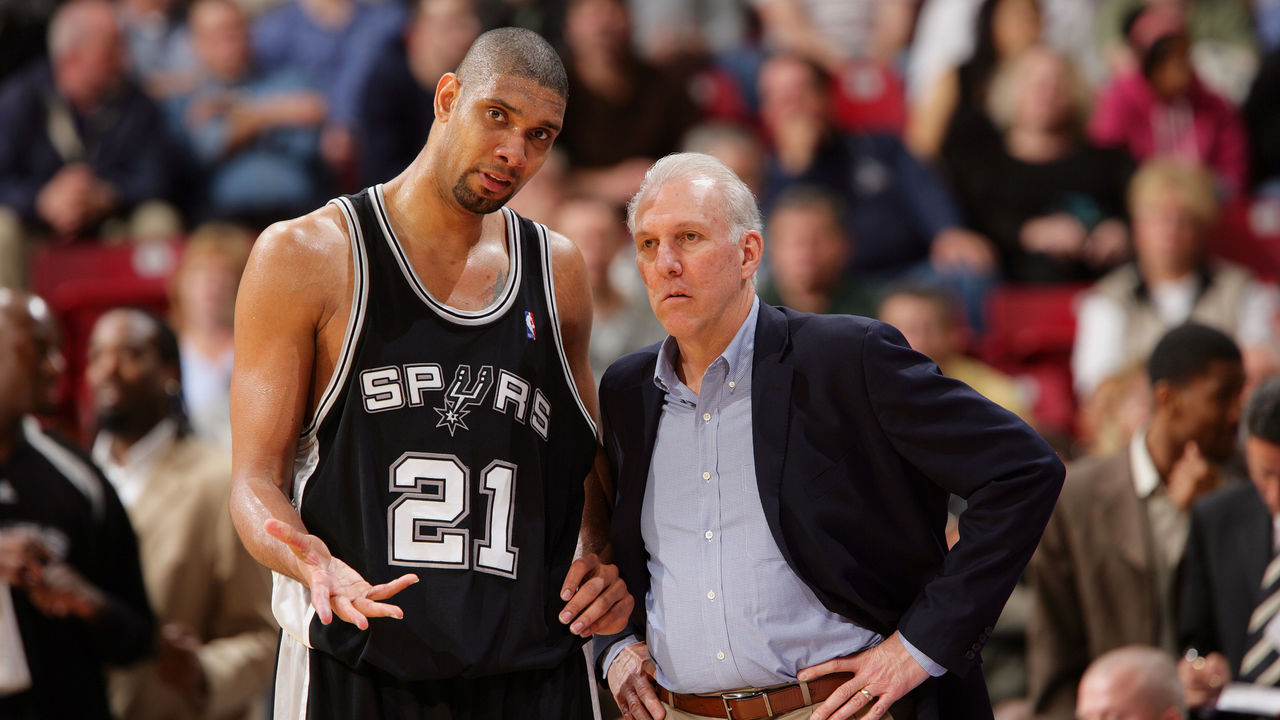
Since 1998, 64 players have appeared in at least 10 playoff games for the Spurs. Franchise icon Tim Duncan (251) leads the way.
Here are the top 15 ranked by games played:
| Rank | Player | GP | Years |
|---|---|---|---|
| 1. | Tim Duncan | 251 | 1998-16 |
| 2. | Tony Parker | 226 | 2002-18 |
| 3. | Manu Ginobili | 218 | 2003-18 |
| 4. | Bruce Bowen | 122 | 2002-09 |
| 5. | Danny Green | 100 | 2011-18 |
| 6. | Matt Bonner | 94 | 2007-15 |
| 7. | Kawhi Leonard | 87 | 2012-17 |
| 8. | Patty Mills | 85 | 2012-19 |
| 9. | Malik Rose | 80 | 1998-04 |
| 10. | Robert Horry | 79 | 2004-08 |
| 11. | Brent Barry | 71 | 2005-08 |
| 12. | David Robinson | 70 | 1998-03 |
| 13. | Boris Diaw | 69 | 2012-16 |
| 14. | Tiago Splitter | 65 | 2011-15 |
| 15. | Michael Finley | 55 | 2006-09 |
Duncan ranks second only to frequent on-court adversary Derek Fisher (259) in all-time career playoff appearances in NBA history, while Tony Parker and Manu Ginobili rank sixth and eighth, respectively. Robert Horry ranks third all-time and made 79 of his 244 career playoff outings as a member of the Spurs.
All-streak team
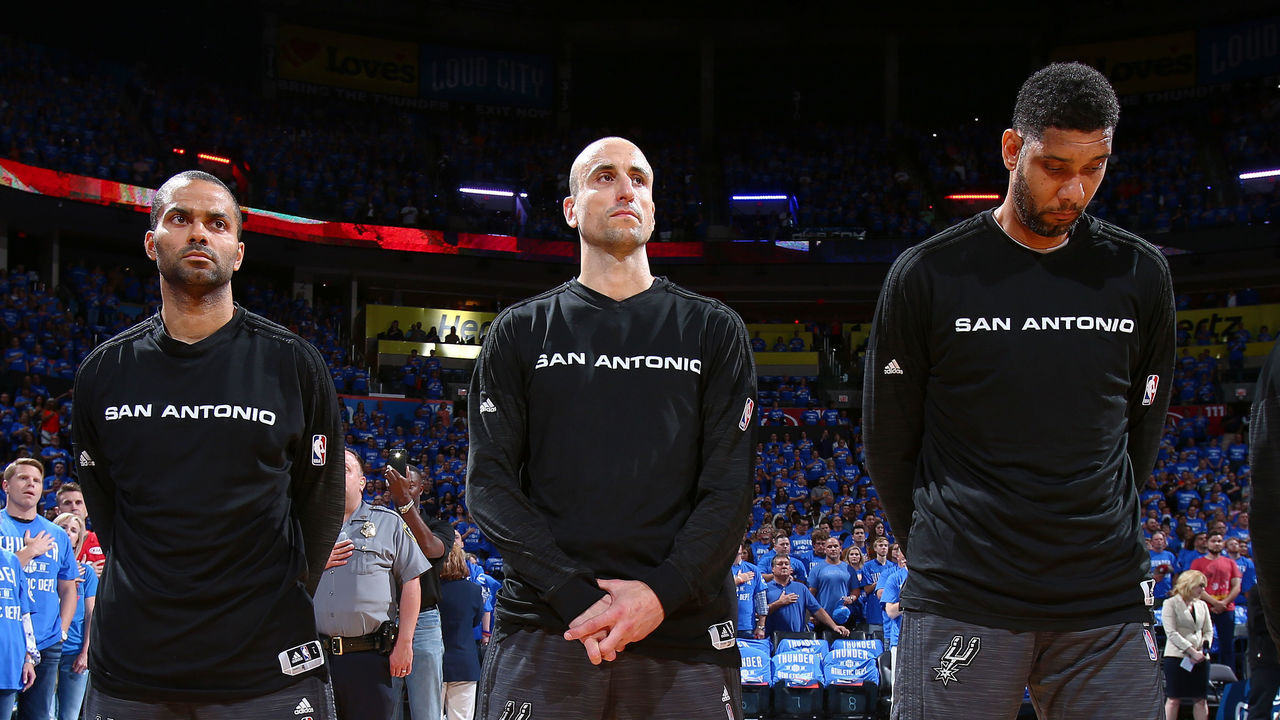
Coach Gregg Popovich: The cantankerous Spurs coach has amassed a 170-114 (.599) coaching record in the postseason and a 5-1 Finals series record. Pop's playoff wins rank third all-time, trailing only Pat Riley (171) and Phil Jackson (229).
G Tony Parker: Parker appeared in each Spurs postseason run from his rookie campaign in 2001-02 to 2017-18. The Frenchman averaged 17.9 points, 5.1 assists, and 2.9 rebounds per game in the playoffs, leading the team to titles in 2003, 2005, 2007, and 2014. He was the Finals MVP in 2007.
G Danny Green: Though an understated contributor to the Spurs' dynasty, Green's 100 playoff caps rank fifth during the streak. The 3-and-D role player averaged 8.4 points and 3.2 rebounds a game with a blistering 41.4% shooting on threes between the 2011-18 postseasons.
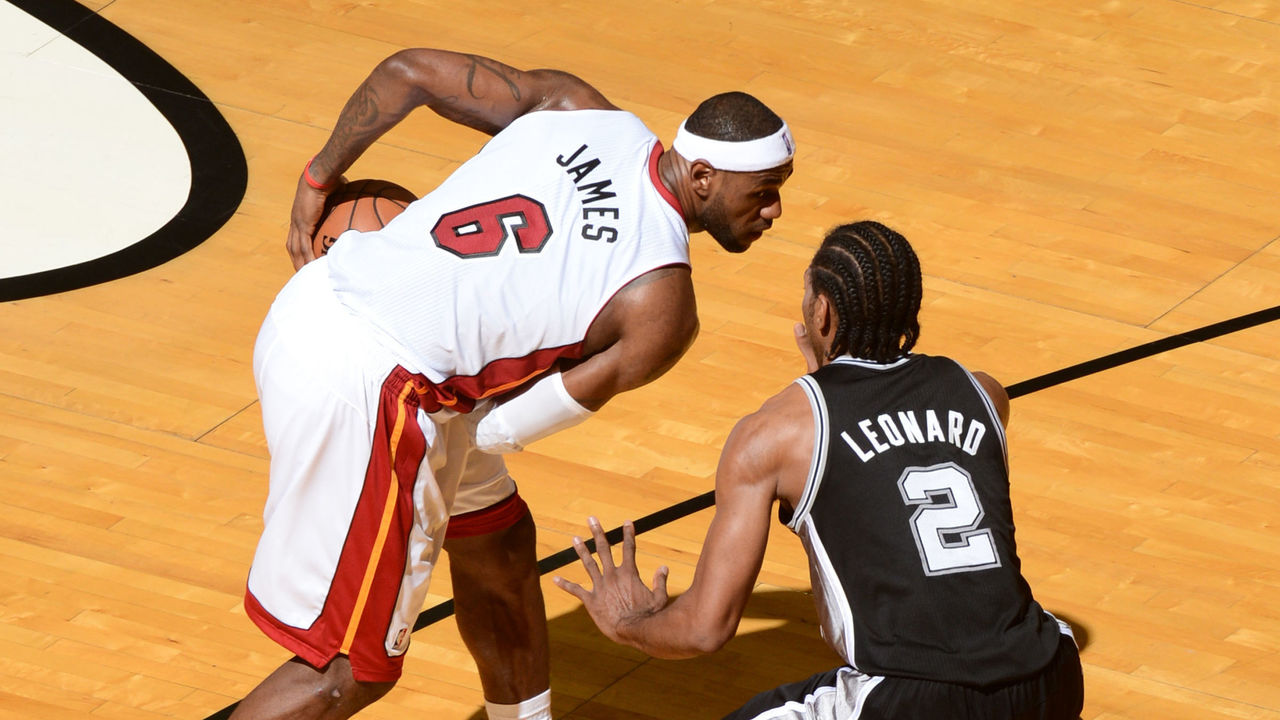
F Kawhi Leonard: Leonard's bad breakup with the Spurs in 2018 obscures his lofty contributions to the organization. The Claw's ascendance during the 2010s helped extend the tail-end of the dynasty and allowed the team's aging stars to shift into supporting roles at times.
Leonard averaged 16.5 points, 7.3 rebounds, 1.9 assists, and 1.7 steals in 87 playoff games from 2012-17. He won Finals MVP in 2014 thanks in large part to his defense on then-Miami Heat star LeBron James. Leonard might have won multiple titles in San Antonio if not for a legendary shot from Ray Allen in 2013 and a questionable tactic by Zaza Pachulia in 2017.
F Bruce Bowen: A perennial All-Defensive team selection, Bowen locked down opposing scorers for most of the aughts. The raw playoff stats - 6.2 points, 2.9 rebounds, 0.8 steals, and 0.5 blocks in 32.6 minutes per game - don't do Bowen justice. He was the team's sandpaper during their second, third, and fourth title runs, giving the Spurs a villainous edge.
F/C Tim Duncan: What needs to be said? Duncan essentially is the Spurs' dynasty. The team qualified for the playoffs in each of his 19 seasons and won all five of their championships with The Big Fundamental playing a central role.
Duncan averaged 20.6 points, 11.4 rebounds, three assists, and 2.3 blocks across 251 playoff games, equivalent to three additional regular seasons. He was the Finals MVP in 1999, 2003, and 2005.
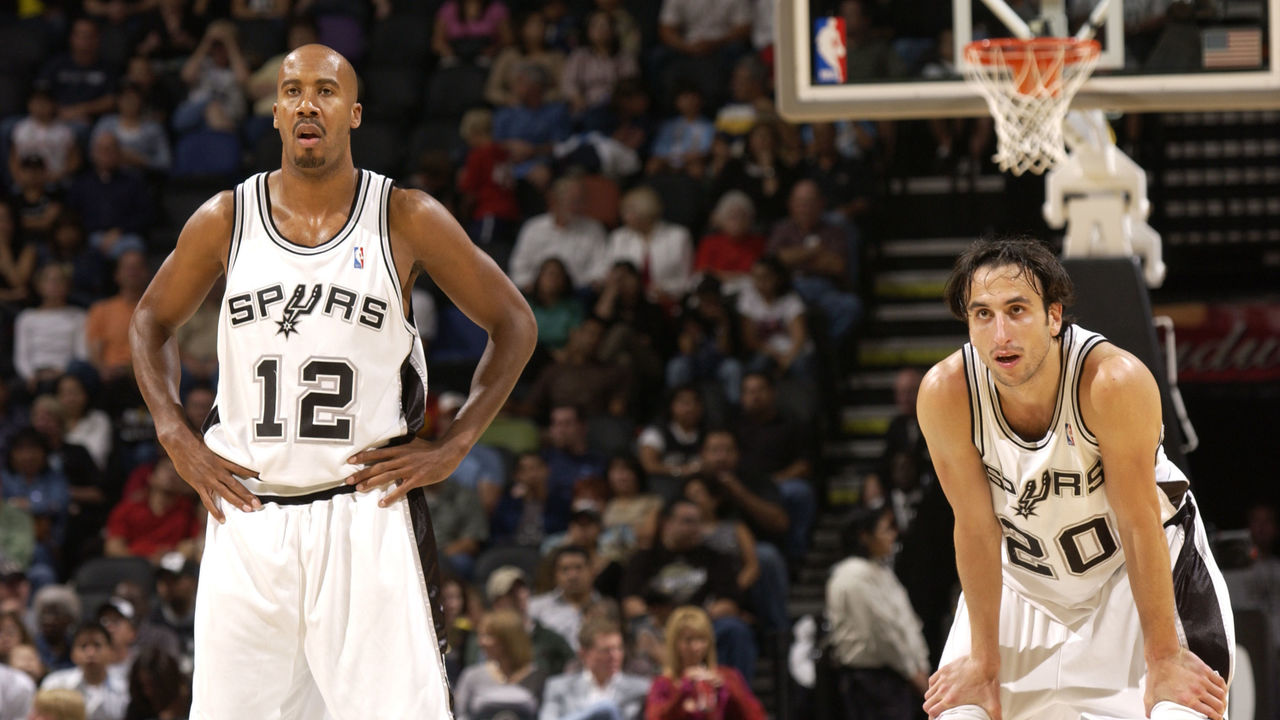
6. Manu Ginobili: Ginobili was a staple of the Spurs' closing unit throughout their multi-decade postseason run despite coming off the bench for the majority of his 218 postseason appearances.
From 2003-18, the crafty Argentine averaged 14 points, four rebounds, 3.8 assists, and 1.3 steals in just under 28 minutes per game in the playoffs. Ginobili elevated his scoring average to 21.8 in his four title-clinching outings.
Honorable mentions: David Robinson was already entering a different stage of his career. From Duncan's arrival onward, Robinson averaged 13.5 points, 9.7 rebounds, and 2.1 blocks across 70 postseason outings - the first six years of the streak.
Patty Mills deserves some props, too. The Australian earned Popovich's trust while helping guide the team from the Duncan-Parker-Ginobili era, through the Kawhi dysfunction, and into today's transitional DeMar DeRozan and LaMarcus Aldridge-led phase. His stats don't jump off the page, but Mills has been an important role player in San Antonio for nearly a decade.
Riveting rivalries
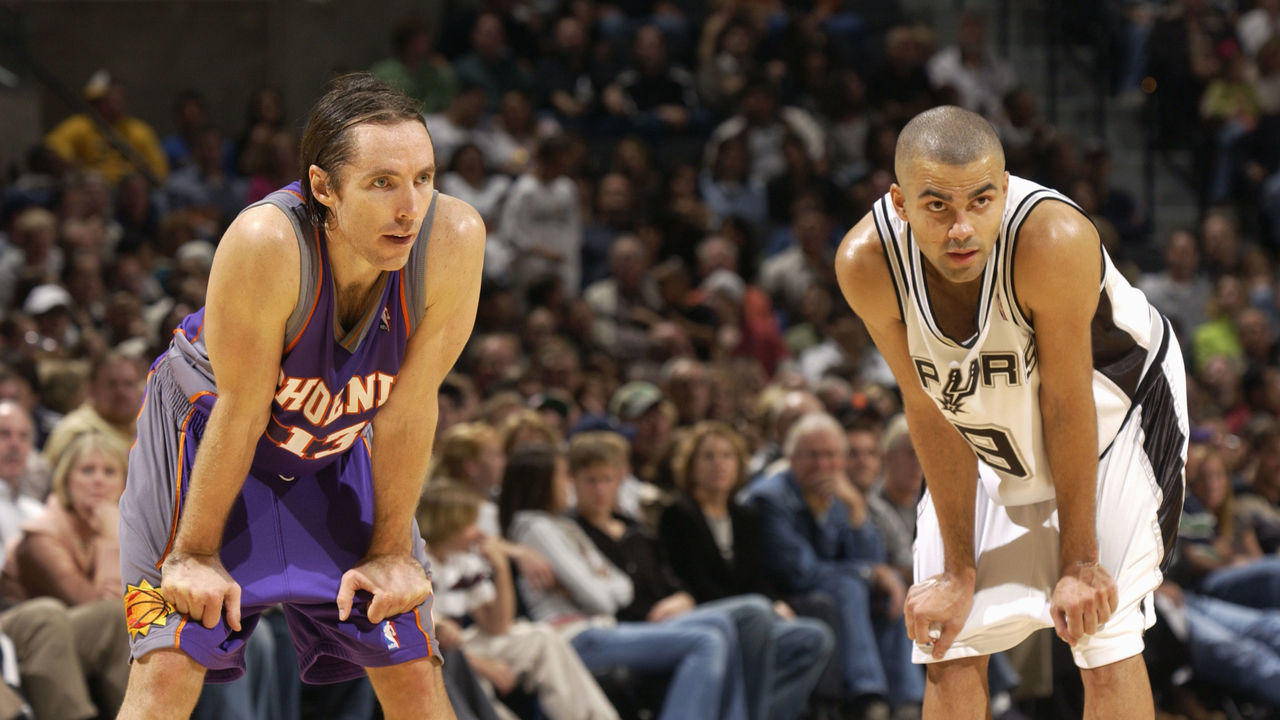
During their playoff streak, the Spurs recorded series victories against each of the other 14 franchises in the Western Conference and toppled five different Eastern Conference opponents in the Finals.
The Spurs finished with postseason winning percentages against 17 teams. The only clubs they had a losing record against were the Los Angeles Lakers (.471) - one of their most frequent opponents with 34 playoff games across seven series - and Golden State Warriors (.333), whose ascendance over the last decade has coincided with the decline of the Spurs' empire.
Here is a complete breakdown of San Antonio's playoff record vs. each team they faced over the past 22 years:
| Opponent | Series | GP | W-L | W% |
|---|---|---|---|---|
| Lakers | 7 | 34 | 16-18 | .471 |
| Suns | 7 | 30 | 16-14 | .533 |
| Mavericks | 6 | 36 | 20-16 | .556 |
| Thunder (SuperSonics) | 5 | 29 | 15-14 | .517 |
| Grizzlies | 5 | 24 | 18-6 | .750 |
| Nuggets | 3 | 17 | 11-6 | .647 |
| Jazz | 3 | 15 | 9-6 | .600 |
| Warriors | 3 | 15 | 5-10 | .333 |
| Heat | 2 | 12 | 7-5 | .583 |
| Clippers | 2 | 11 | 7-4 | .636 |
| Trail Blazers | 2 | 9 | 8-1 | .889 |
| Timberwolves | 2 | 8 | 6-2 | .750 |
| Pelicans (Hornets) | 1 | 7 | 4-3 | .571 |
| Pistons | 1 | 7 | 4-3 | .571 |
| Rockets | 1 | 6 | 4-2 | .667 |
| Kings | 1 | 6 | 4-2 | .667 |
| Nets | 1 | 6 | 4-2 | .667 |
| Knicks | 1 | 5 | 4-1 | .800 |
| Cavaliers | 1 | 4 | 4-0 | 1.000 |
New active streaks
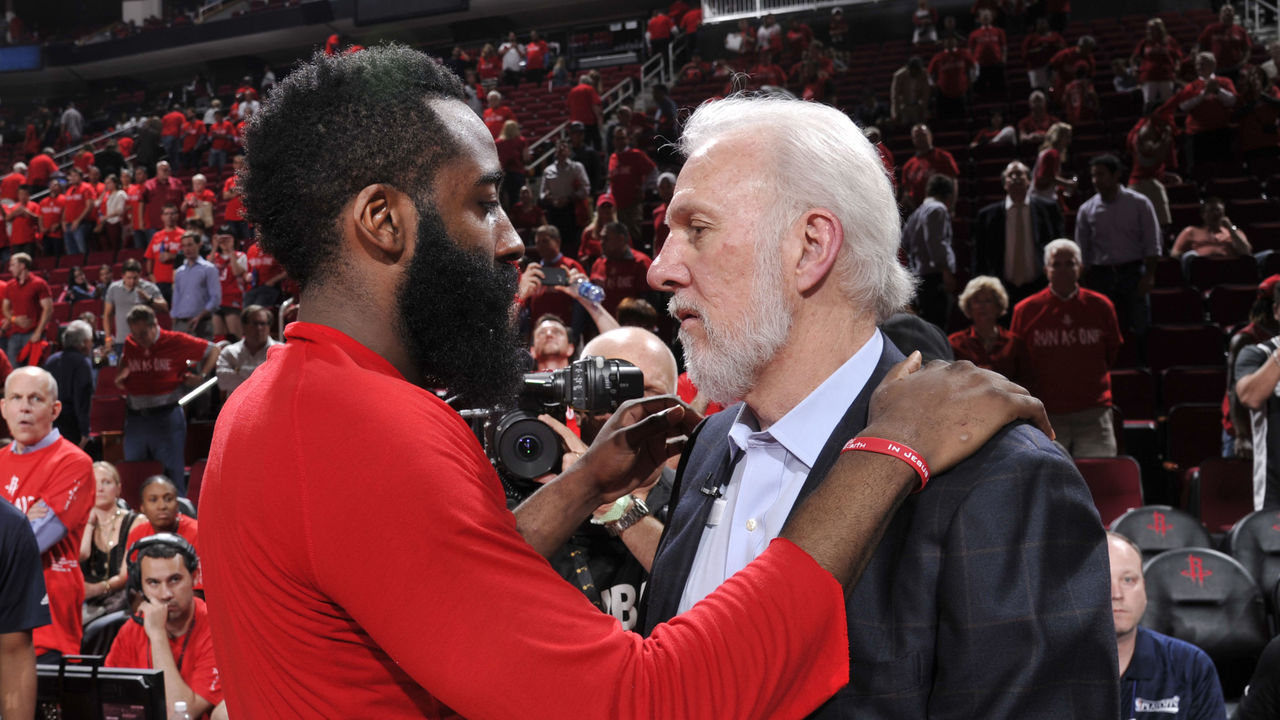
With the Spurs' 22-year streak - as well as the Warriors' seven-year streak - falling this year, the Houston Rockets now possess the longest active postseason streak at eight, followed by the defending champion Toronto Raptors at seven.
| Rank | Streak | Team | Start |
|---|---|---|---|
| 1. | 8 | Rockets | 2013 |
| 2. | 7 | Raptors | 2014 |
| 3. | 6 | Trail Blazers* | 2014 |
| 4. | 6 | Celtics | 2015 |
| T5. | 5 | Pacers | 2016 |
| T5. | 5 | Thunder | 2016 |
The Portland Trail Blazers moved one step closer to earning their seventh straight playoff appearance with a win over the Brooklyn Nets on Thursday. The Blazers now need to defeat the Grizzlies in a one- or two-game play-in round in order to clinch the Western Conference's No. 8 seed.